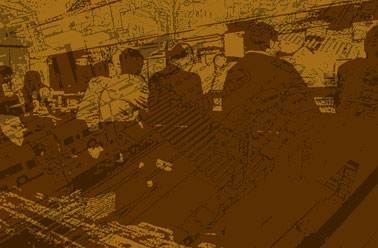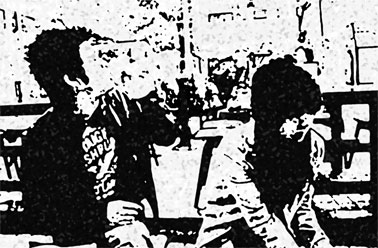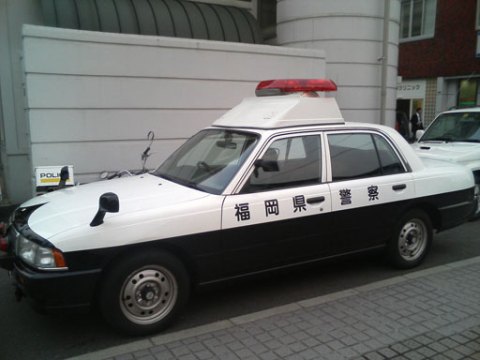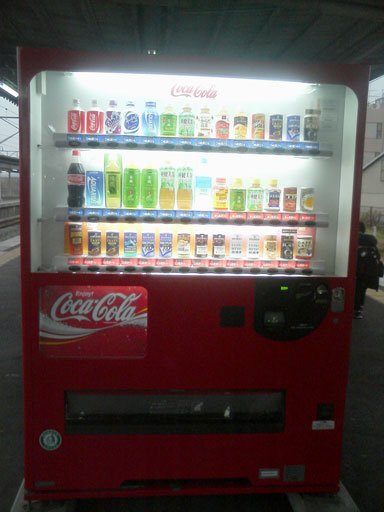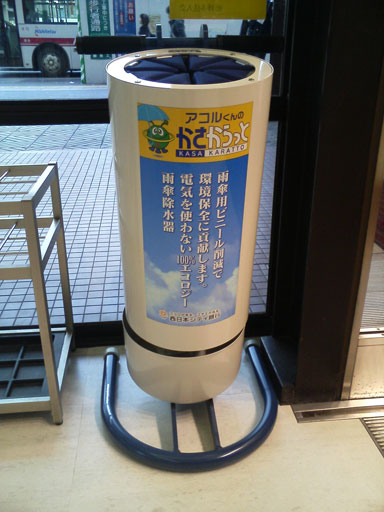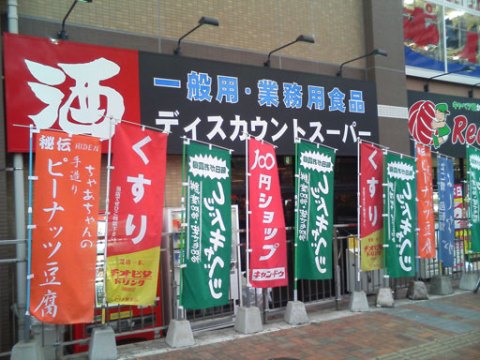Posts Tagged ‘japanese’
A bike ride
Posted on: November 11, 2008
- 735 yen for creamed corn soup
- Delicious Japanese Kimchi
- Japanese waiting for a chance to win a prize
- Japanese waiting to win a drawing
Today I went on a long bike ride. I rode from Fukodaimae to Kashii. On my trip I took a few pictures. The weather was great today. A little cold, but the sun was shining. I stopped off at Aeon mall where I saw hundreds of people lining up for their turn to win a prize from the grocery store’s lottery. Basically you turn a handle and it makes the balls in an octagonal box go round and round until a ball pops out. The value of your pize depends on what color ball you draw. It looked like most people won vouchures or discounts on merchandise, because nobody walked away with a very big smile while I watched from the Starbucks across the way. I had a hot dark cherry mocha coffee. It was probably one of the best coffees I’ve ever had.
On my way home I saw a girl in a junior high school uniform get clipped by a car while she was riding her bike uphill. The girl wasn’t injured. She gave me the stink-eye when I looked at her as I rode past. The driver was a young thirty something lady in a white mini-car. The driver was more shook up than the girl, who just looked pissed off.
While I was waiting for a train to pass I overheard to college age girls behind me talking about their friend Midori. According to them, Midori likes chubby guys and she recently bought a t-shirt. Also one of the girls was very sleepy. She told her friend that she only got six hours of sleep. It wasn’t the most interesting conversation, but that’s just an example of what Japanese girls talk about.
Killing time and eating dogs
Posted on: October 15, 2008
- In: funny | humor | Japan | japanese | japanese art | jokes | pictures | Random | unique
- Leave a Comment
Many of the people who come to my Weblog are searching for one thing. The answer to the age old question. Do Japanese people eat dogs. The answer is “no” they don’t, but because I had nothing better to do while I waited for Hereos to finish downloading I made a t-shirt for all you out there searching for the truth.
If you like the shirt you can buy one at www.cafepress.com/gorillaskin
Garbage Day
Posted on: August 9, 2008
Today I went outside to put my garbage out. I didn’t see the blue netting that usually covers my area’s garbage, so I walked toward the next little collection site. There was a little old woman of at least 60 years old. She was having trouble lifting the netting. Just as I was about to help her with it, she dropped the netting and said to me in Japanese, “What country are you from?” I pause. “America.” “This garbage collection site is for this side.” She pointed to an area behind her. “But there is no netting out for my site.” I don’t want to clean up garbage from the street if the crows decide to pick through the uncovered garbage bags. “Put it over there. They’ll put it out soon.” She said. I turned away. I stepped towards my usual collection area. Why does it matter if I have one small bag of garbage? I turned back. The old lady was gone. She was probably looking out from her window to see if I would disobey her – waiting to call the garbage police on me. I dropped the garbage off at my usual spot. I walked back home. Japanese people are rude. She asked me what country I’m from for two reasons. The first was to see if I understood Japanese. The last reason was so she could report to her neighbors or the garbage police which country the foreigner was from. She didn’t even ask my name. .
Here are some words I hear on Japanese TV and among young people.
Ikeru – That’s cool or funny
Ukeru – That’s cool or funny
Ikemen – Cool guy
hanpajanei – that’s really cool or awesome
hana takai ne – your nose sure is pointy
Hada ga shiroi ne – you sure are white
The last two I get a lot from Japanese people who are meeting a westerner for the first time. It’s interesting to hear what they say sometimes. I would never go up to a Japanese person and say, “Your skin sure is yellow” or “Your eyes sure are slanty.” But when they say, “Your skin sure is white” or “Your nose is pointy” they don’t mean it as an insult. They are just marveling at the differences. Which is ok, but after it happens to you several times it gets annoying or you get used to it.
They also like to say, “Hello”. I’m not talking about meeting friends or coworkers. I could be minding my own business when a random Japanese guy will come up to me and try to practice his English on me. Sometimes I ignore it and sometimes I need a good laugh so I play along, but it can be really annoying when you are trying to catch a train and some road scholar wants to know what country I’m from. They usually ask the right question, “American?” but it annoys the crap out of my English and Australian friends because they always get asked, “American?” I’ve seen one of my friends fake being French in order to avoid one of these impromptu English lessons. I wish that I could say this is a fairly unique and singular experience, but I’ve heard similar stories from almost every English speaker I’ve met in Japan.
The Stuff Japanese people like
Posted on: April 10, 2008
It’s time to break out the world’s smallest violin. I’ve been reading here on wordpress that a particular blog called “The Stuff White People Like” is getting a book deal through Random House publishers. Sure it’s been going on longer than my blog, and it’s a lot more interesting, and people find it really funny or offensive. But I can’t keep on thinking why not me? I can be offensive and I don’t even have to try really hard. But it’s that kind of offensive that makes people laugh that people really want read about or put their hard earned cash towards. All this time I’ve been thinking of ways to get people to look at my blog and get interested when all I had to do was start writing, funny yet offensive things. I’ve been such a fool. Without further ado I give you
“The stuff Japanese people like”
#10 American women.
If I could go another day without seeing a commerical for Cameron Diaz using Japanese cell phones or another promo for Avril’s new CD it would be a good day. For one thing, Cameron Diaz is getting old. She’s what 60 now. But in Japan 60 is the new 40 or so they’d have you believe.
#9 Hip-hop
I’ve said it before and I’ll say it again. Japanese people love hip-hop. You can see groups of wannabe gangsters and rappers at every Tsutaya or Ministop (Translation: Blockbuster Video or Circle K). Most of the kids here can’t put together a cohegent sentence in English, but they love to listen to it anyway if you put a nice beat to it.
#8 Listening to Americans curse.
I’ve had many a conversation with Japanese people and if it should so happen that a real curse word should come out of my mouth (by accident of course) well it would just get that Japanese person tickled pink. “It’s like I’m in a Movie” is the response I got once from a Japanese friend of mine.
#7 Eating Whales.
It’s not something you think about everyday in America, but Japanese people love to eat whales. They think it is their God given right to do so. I once tried to argue that it is wrong to eat certain animals because they might go extinct and that it was a simple matter of numbers. The rebuttal I got was “It’s food culture.” So in other words it’s tradition. I can’t argue with the fact that it is a part of Japanese culture. If Japanese people want to eat “Shamu” I’m not going take the chopsticks from their mouths.
#6 Hating on the Chinese
If anything Japanese love more than eating whales it is Hating on the Chinese. You think white people like to complain about immigrants taking their jobs – well the Japanese can hate on Chinese people for everything. Now it is true that the Chinese make about 97% of everything in the world. Just turn over any 10 products in your home and look at the label on the botttom and you’ll see what I mean. China makes everything. Well recently there have been a few tainted food problems with gyoza (chinese dumplings) and it has been causing quite a stir. Every news station and newspaper had to report on it. If anything wrong happens in Japan, Japanese people can trace it all the way back to China in an instant. Doctors incompent – must of given some bad chinese medicine to his patient. Kids behaving badly – they must have eaten some bad chinese candy. Got yellow sand on your clothes – it must be those Chinese again making those winds blow from the Gobi desert.
#5 Manga (Japanese comics)
Everyone in Japan either loves comics or at one point in their live they did love comics. I can go up to any random Japanese person on the street and ask them what managa do you like and they will give an answer in a reasonable amount of time. You see it everywhere. If you want an to study for the test to become a civil servant, there is a manga for that. If you want to learn how to do simple home repairs, there is a manga for that too. And it’s not just a simple illustrated guide. Thee is even a manga for women who marry foreign men and have a baby. I’m not joking at all. I saw it and read through it at the bookstore just the other day.
#4 Traveling
Most Japanese people have been to more places than the average American person. I know this because I asked them. They’ve been to Hawaii, New York, Los Angeles, Las Vegas, Mexico, Paris, Turkey, Italy, Spain, Germany, Sweden, Holland, Saipan, Macau, Taiwan, Korea, China, Vancuever, Tornoto, Indianpolis, Boston, Australia, England, New Zealand, Africa, Peru, and Brazil. How many of these places have you been to? Not many I think unless you’re a military brat. But even with all the traveling they do the average Japanese person does not know who to have a normal conversation with a foreignor. I have met a few who do, but for most travel is just about picking up souvenirs. The ones who do have made close friends with foreignors and are a pleasure to talk to if you ever get a chance to talk to them.
#3 American TV shows
If you ever want to strike up a conversation with a Japanese person. Just ask them if they’ve seen “Prison Break”, “24”, “CSI”, “The 4400”, or “Lost” and they with tell you all about their favorite character and what was the last season and episode they watched. They also love “Full House”. It’s scary, but true.
#2 Eating raw stuff
If ever you go to any formal kind of party in Japan, be prepared for the possiblity of eating raw or possibly moving things. There is a food dish in Japan where they eat live squid. Now I’m ok with eating raw fish, I’ve become accostumed to it, though I still prefer cooked over raw, but eating my food while it’s still alive is not very appetizing.
#1 Rice
It’s true. Japanese people like rice. Not only do they like it, they love it and use it everything: rice paper, rice cakes, rice balls, rice wine, and rice gruel. If you go to a Japanese home you will be asked if you like rice. If you don’t they will be put in kind of a bind. “What can I feed a person who doesn’t eat rice?” I have no problem with rice. In fact I eat it almost everyday. Some Japanese people can go so far as to tell you where the rice is from in Japan, just by tasting. But that is truly rare. However many Japanese people do have a preference for one kind of rice over an other. Also most have a particular hardness or softness of rice that they like more.
I want the monies
Posted on: April 7, 2008
Where are the monies? When am I going to get the monies? And so on and so forth… I love the Simpsons. Here are some of my new pieces. If you like them you can buy posters at my shop. www.cafepress.com/gorillaskin Also if you appreciate my artwork and would like to donate please click here:
City Life in Fukuoka Japan
A couple at a gyoza restaurant in Tenjin
99 yen equal 1 dollar
Posted on: March 29, 2008
It is official 100 Japanese yen is worth a little more right now than US dollar. It’s good for me right now because I’m earning Japanese money. So if I send money home it makes my bank account look that much bigger. True I still get charged $4o by the banks, but I can’t change that fact that banks are run by crooks.
I’ve been looking up the history of the two currencies and it looks like things in the Japanese economy are going to start to pickup, while the US economy might be dragging a little behind this year. But nobody knows what is in store for tomorrow. You might have potatoes or you might have cheese whiz. Then again, you might not have either if things get any worse.
If you want to check it out yourself please go right ahead http://au.finance.yahoo.com/currency/convert?amt=1&from=USD&to=JPY&submit=Convert
While you’re at it check this out too. www.cafepress.com/gorillaskin
The monies
Posted on: March 21, 2008
- In: ALT | etymology | fukuoka | Japan | japanese | jobs | linguistics | OWLS | owls alt | teaching | Uncategorized
- 3 Comments
Well It looks like my plan to keep a record of my food is a wash. I can try and start it again, but alas as the Japanese say, “Shoganai” (Et cant be hept). Translation for those who don’t speak Texan “It can’t be helped.” Basically I’m feeling lazy or as the British people say, “I can’t be bothered.” I love that saying, “I can’t be bothered.” You pick up all kinds of little differences in your own English and other peoples in Japan.
On many occasions I have been cornered in my classroom when my students ask, “Why do they say it this way.” Invariably the answer is, “That’s just the way we talk.” If you turn the question around on them and ask them why a certain Japanese phrase is the way it is, they give you the same answer – sometimes you get the blank stare of horror. It is true that many expressions do have an origin, but it can really bring a lesson to a halt when you try and over-analyze everything. Especially when the goal is to teach conversational English and not the history of the language. If I know the origin of a phrase or word, I enjoy sharing my knowledge. But my knowledge on word origin and turns-of-phrase is finite. There is a good number of books out there on the subject of etymology (word origin) and I’ve been meaning to buy one, but it all comes down to the monies. Then again knowledge is important too.
I don’t know if you’re like me, but I have a tendency to collect more books than I actually read. I like having books around. You never know when you might need that information that a certain book might have. It is a habit I picked up from my parents and one of my teachers. My art teacher in college said, the trick to being creative is having a good library to get inspiration from. And it really does help. Even in the translating world I hear that having a good selection of reference materials is essential to the translation process. A translator most be a voracious reader forever thirsting for knowledge.
On a different note:
I heard back from my company today. I tried to bargain with the company for more money. I figured I’d give them a chance to do the right thing. They just sounded upset and the conversation ended rather quickly. I should hear back from them soon enough. It will be interesting to see how the situation unfolds.
I had a 50/50 chance
Posted on: February 9, 2008
I came home from work after a miserable day. The classes were fine. Nobody at work was irritating me. I just felt really bad. My joints were all achy. I had a sore throat, a runny nose, a headache and chills to top it off. I took my mother’s advice and took some Bufferin and vitamin C rested. When I got home I saw a single letter waiting for me in my mailbox. The lettering was handwritten with no return address. I wondered for a moment who it was from. Then I read at the bottom examinee number. It was the results of my JLPT.
I had been waiting since December 2nd to find out my results. I got inside my house as soon as possible. I dropped my key as I fumbled through the entrance with excite me. I didn’t want to look. I thought I had a 50/50 chance right after I took the test, but as time passed I wasn’t so optimistic. I gently opened the letter. Inside was a postcard. I opened the postcard. I hadn’t even taken the time to turn on the lights. In the dim light I read GOKAKU. I passed Level 2 of the Japanese Language Proficiency Test. http://momo.jpf.go.jp/jlpt/e/about_e.html The average score for the test based previous tests results is about 217 points. To pass the test you must get at least 240 points. I managed to get 246 points.
Let me sum up what this means. It means that God has been good to me. I was almost certain of failure as I opened the letter, but despite all my doubts I passed. With the certificate I can get a better job. I’m not sure what kind of job, but most definitely a better paying job. I could increase my salary by at least 1 – 2 million more yen per year (about $9,315.75 – $18,631.51). I need to start searching for a job soon. The new fiscal year starts April 1st in Japan and many companies hire new people just before then.













